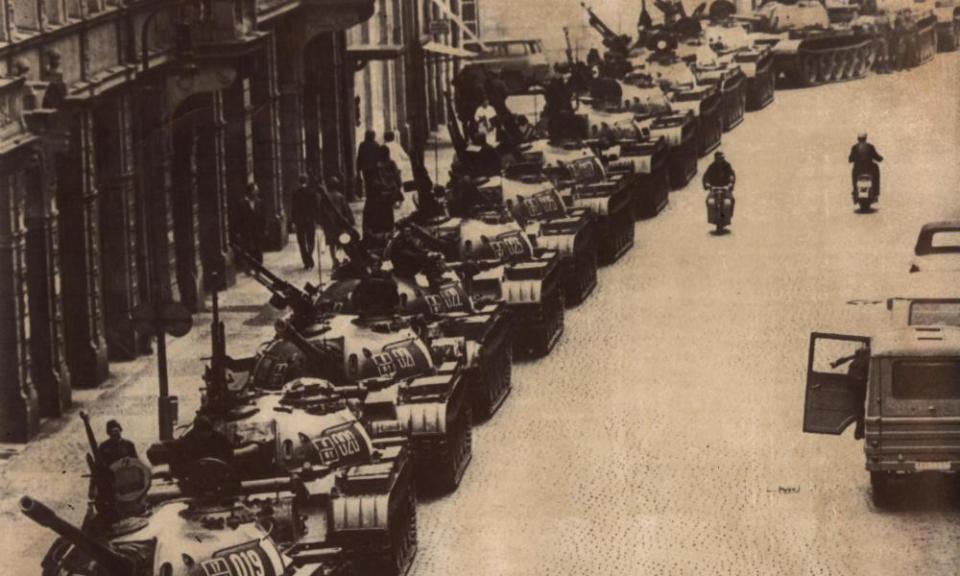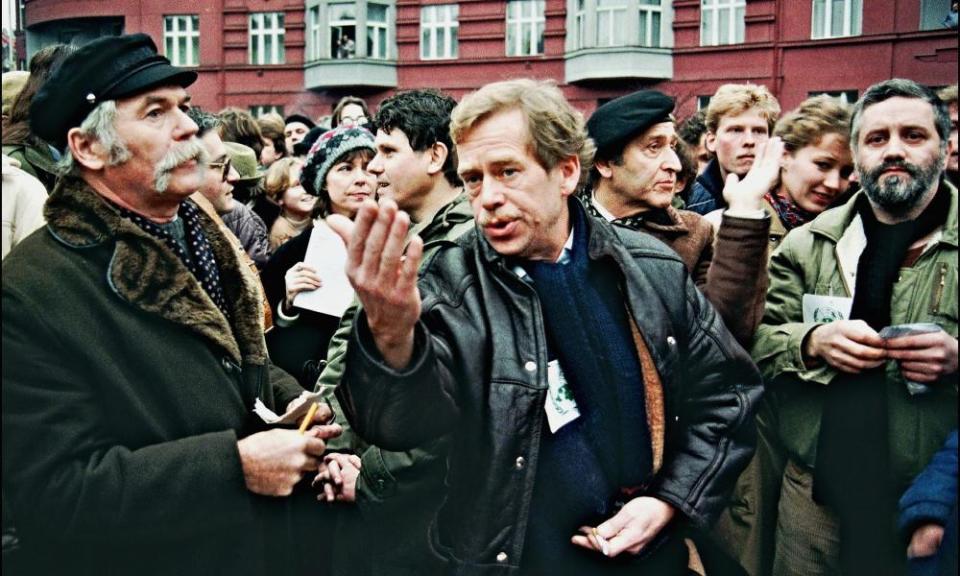Corbyn, the spy and the cold war’s long shadow

It’s the mid-1980s and a group of Islington North Labour party activists are in a quandary. Some want to show support for Solidarity, the trade union movement that emerged from Poland’s shipyards in opposition to the hegemony of the USSR.
But one member of the group is fretting: “Solidarity is supported by the Catholic church and they’re reactionary.” Another member has an alternative reason for refusing support: “Don’t the Poles want to defend the gains of the revolution?”
Susan Greenberg, now an academic but in the 80s a journalist, had been invited to talk to the meeting about her recent reporting trips to central Europe. “I shall never forget it. They were using classic Leninist language. Gains of the revolution? Poland was occupied by the Soviet Union. But they were attached to this romantic idea of the Bolshevik revolution. I was gobsmacked. This was the Labour party in the Islington North constituency of Jeremy Corbyn in 1987.”
Greenberg’s recollection is far from unique. Many Labour-run London boroughs were having similar debates. In the 80s, Hackney council was dominated by the hard left, many of whose members were pro-Soviet. “You would go to meetings where people would extol the health systems of East Germany,” recalled Harry Fletcher, the London secretary of the Anglo-Russian Society, which sought to foster good relations between east and west through culture and sport. “They would talk about how everyone in the Soviet bloc had a job.”
The 80s were a strange, conflicted time for many on the British left, not least Corbyn, whose geopolitical sympathies are now under scrutiny thanks to garbled – and much derided – allegations from a former Czechoslovakian spy. Ján Sarkocy has claimed the Labour leader as an asset of the Soviet bloc intelligence services during the era of Ronald Reagan and Margaret Thatcher.
Corbyn’s lawyers have threatened to sue, and the Labour party has called the claims “ridiculous”. That there is no evidence for this claim – the bodies that maintain the archives of the East German and the Czechoslovakian security services have said there is no mention of Corbyn as an active agent in their files – has not stopped the Labour leader’s critics from using it to remind voters that many now in the senior echelons of his party have questions to answer about their cold war allegiances.
The crushing of the Hungarian and Czechoslovakian uprisings in 1956 and 1968 had exposed the brutal disregard the Soviet regime had for those who stood up to it. Many on the left were appalled and renounced communism. Others backed dissident movements such as Charter 77 in Czechoslovakia, the campaign group formed partly in response to the arrest by the Czechoslovakian authorities of members of the psychedelic band Plastic People of the Universe, which was championed by intellectuals on both sides.
Those who continued to carry a torch for the USSR splintered into opposing factions: Stalinists, and peaceniks who feared the arms race would deliver nuclear armageddon.
This fear was expertly cultivated by Soviet intelligence agencies who, through financial support for myriad political movements opposed to western imperialism, deftly portrayed the Reagan administration as a threat to global peace.
Jon Bloomfield, a member of the Campaign for Nuclear Disarmament, attended an anti-proliferation summit in Prague in 1983, an event promoted by the Soviet authorities, where he met Charter 77 dissidents, something that angered many on the Left who saw dissident groups as a threat to the USSR.
“The apologists and the Stalinists said we were lackeys of the west and the bourgeoisie,” Bloomfield said. “I got lambasted in the communist press by people who thought the Soviet side was right and anyone who queried them having SS-20 missiles was wrong.”

Soviet intelligence agencies understood how the peace movement could be exploited. Bloomfield says he was aware there were Soviet agents at Greenham Common – he vividly recalls one North African peace campaigner with an astonishing ability to spew out Soviet propaganda.
Journalists were another target. The literary editor of the Guardian, Richard Gott, resigned from the paper in 1994 after allegations that he was among “agents of influence” recruited by the KGB. Gott admitted “culpable stupidity” but denied taking KGB money.
Writing last week on the Little Atoms website, Paul Anderson, a former Tribune editor, claims he would meet Sarkocy, whom he was convinced was a spy, with a view to pumping him for information about what was happening behind the Iron Curtain. According to Anderson, it was inevitable that backbench Labour MPs, including Corbyn were deemed ripe for cultivation. “Labour Action for Peace, a pressure group that had no formal role in the Labour party, and for which Corbyn was an officer, was notoriously and idiotically pro-Soviet,” Anderson writes. Stasi files indicate the group was targeted by East German agents who sought to influence its policies.
“The Stb, the KGB, the Stasi –all these organisations worked the same,” explained Darren G Lilleker, associate professor in political communication at Bournemouth University and author of Against The Cold War: The History and Political Traditions of Pro-Sovietism in the British Labour Party, 1945-1989. “Most of them were driven by what the KGB was doing, which was based on the network Stalin set up to seek out the low-hanging fruit, people who would be sympathetic, and then draw them into this web. When people were promoted, they would have leverage over them and could blackmail them. These people in the network were plausible; they would come across as internationalist, and try to talk to members of the left on a level that they would get.”

Lilleker interviewed several MPs of the left who in the 70s and 80s were targeted by Soviet agents. “James Lamond and William Wilson, they really allied themselves [to the Soviet view]. They described how they would meet these people and believe in them. They so wanted the world to be at peace, for things like Vietnam and Cambodia and Grenada to be a feature of the past and thought if people could recognise that Russia was not evil, people could stop dying unnecessarily. That’s what they wanted and that’s a feature of Corbyn’s politics.”
Whether Corbyn was blind to the faults of the Soviet bloc is debatable.
His defenders point out that Jan Kavan, a leading light in Charter 77, regards the Labour leader as a friend, something that would be difficult to square if he saw Corbyn as a Soviet stooge. In December 1989, Corbyn was one of only four MPs to sign a parliamentary motion congratulating the “magnificent outburst” by striking workers in Czechoslovakia “against the corruption and mismanagement of the Stalinist bureaucracy”.
“Corbyn was mentored by Tony Benn,” Lilleker said. “And Benn was very smart. He knew exactly what the Russians and satellite countries’ secret service people were after. Benn was very much the Marxist but very anti-Soviet.” Nevertheless, by aligning itself in opposition to the US, parts of the British left had become the perfect echo chamber for Soviet propaganda.
“They really believed that the world should have gone in a different direction between 1945 and 1950,” Lilleker said. “That was the point where Russia, Britain and America should not have split up Germany but worked together. The left tend to level the blame for this failure at America. Their argument would be, ‘Well, Nato was created first, so the Soviets had to create the Warsaw Pact’.”
All this could be consigned to the dustbin of history if those who held such views, and are arguably opaque about whether they still hold them, were not on the verge of forming the next government. How they see the world suddenly matters.
“Even though Russia is no longer communist, there is still this assumption on many parts of the left that it is anti-imperialist, and they’re willing to turn a blind eye to things Russia does in other countries,” Greenberg said. “There’s a continuity between that part of the left’s attitudes back then to Czechoslovakia and its dissidents and its attitudes now to Russia’s invasion of Ukraine and its involvement in Syria. Those old attitudes are still there.”
Sarkocy’s claims about Corbyn may not pass muster, being more farce than tragedy. But for many on the British left, history is repeating itself. It is hard to escape the shadow of the cold war past.

 Yahoo News
Yahoo News 
